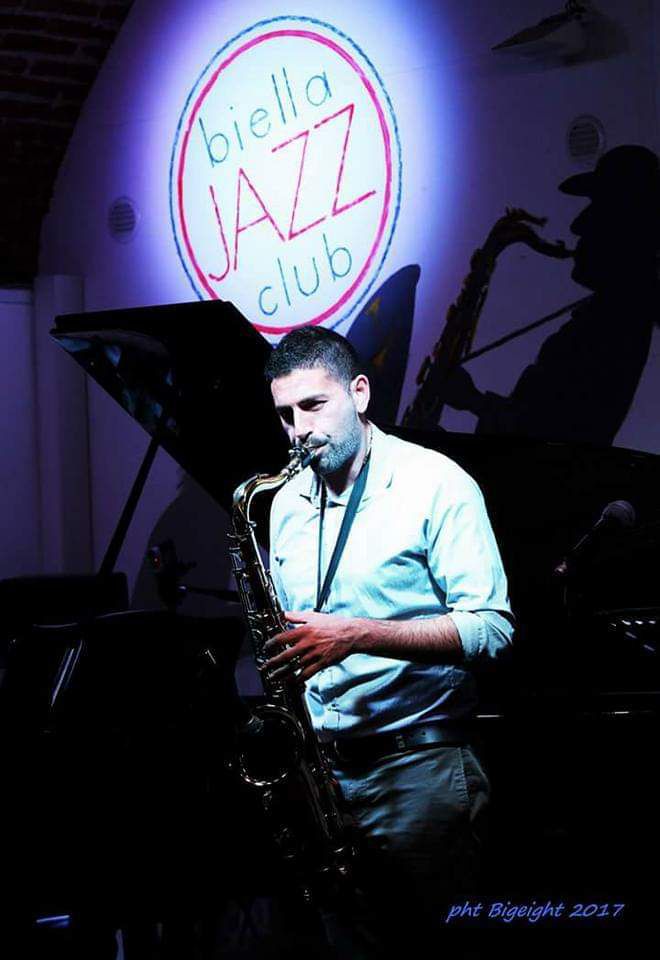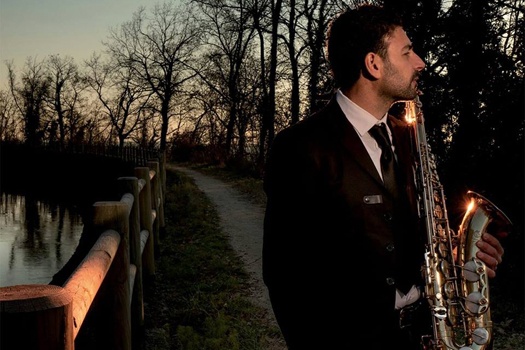Jazz interview with a bad musician, as if saxophonist Peppe Santangelo. An interview by email in writing.
JazzBluesNews.Space: – First let’s start with where you grew up, and what got you interested in music?
Peppe Santangelo: – I grew up in a small town in Sicily, in Sciacca. I was drawn to music from curiosity, and then decided to deepen the study after listening to Blue train disco by John Coltrane.
JBN.S: – How did your sound evolve over time? What did you do to find and develop your sound?
PS: – My sound has evolved over time thanks to the exercise focused on an idea of sound that I made myself listening to the great saxophonists who inspired me. I consider sound in jazz a set of values; timbric, rhythmical, phraseological, architectural, intonation, swing. I have always done targeted listening, which took me in the direction I wanted. My Name Is, my new album is a tangible demonstration.
JBN.S: – What practice routine or exercise have you developed to maintain and improve your current musical ability especially pertaining to rhythm?
PS: – I have different ways of studying that I change every 3 months. This is because after a while the brain gets used to automatisms, and since my goal is music, I always change my method to deceive it. A great chapter could be opened on the way to practice, to do it in brief I limit myself to the question about rhythm. I practice standards by transposing them in all shades and at all times, this always gives me great mental and executive flexibility.
JBN.S: – Which harmonies and harmonic patterns do you prefer now? You’re playing is very sensitive, deft, it’s smooth, and I’d say you drift more toward harmony than dissonance. There is some dissonance there, but you use it judiciously. Is that a conscious decision or again, is it just an output of what goes in?
PS: – In this phase of my musical life I look for my patterns, my personal harmonic connections. I prefer to play on harmony, looking for dissonance as a moment of transition, a different color that resolves on the armony of the song. I like the challenge of instant search, of the moment, the notes of the stream of consciousness, which sometimes happen by chance, and surprise myself, but that doesn’t mean that I haven’t looked for them. Posing in an attitude of flow towards music involves taking on great risks, and it’s something you prepare at home, in your studio.
JBN.S: – How to prevent disparate influences from coloring what you’re doing?
PS: – It is a problem that I never pose to myself, I have always been myself, and it is something that has always come naturally to me.
JBN.S: – What’s the balance in music between intellect and soul?
PS: – For me the balance between intellect and soul is everything. Playing with the mind makes you appreciate by the people, but composing and playing with the soul makes you immortal. When I compose I always value the weight that the soul can have in the melody and in the performance. it is the aspect that interests me most in my music, and this links us to the flow of consciousness in the execution of the previous question.
JBN.S: – There’s a two-way relationship between audience and artist; you’re okay with giving the people what they want?
PS: – I believe that today, often the public welcomes an artist in a more careful and available way than the experts.
The public is much more open to news than critics and musicians are. This is because the latter are very much imprisoned by canons and schemes that limit knowledge itself. The public, on the other hand, is much more open and attentive to the underlying message, rather than to the superstructures.
JBN.S: – Please any memories from gigs, jams, open acts and studio sessions which you’d like to share with us?
PS: – Yes many good memories. The recording of the disc My name is in December. A tribute to John Coltrane for the JAZZMI Jazz Festival, a tribute to Jimi Hendrix in Jazz for Carroponte Produzioni, the jams I directed at Busto arsizio and Gallarate, the artistic direction of the Teatro del Popolo in Gallarate, the jam of Bagatella in Varese, and much more ..
JBN.S: – How can we get young people interested in jazz when most of the standard tunes are half a century old?
PS: – We need to introduce jazz as a language in schools as soon as possible. Unfortunately politics goes against the trend here in Italy, and I can also understand why, jazz is the language of expressive freedom, and no institution likes to advocate this cause, better conservatives. Furthermore, it is necessary to recreate the places of live music, meet, play live, exchange ideas. that’s how you learn this music, but above all it’s how you learn to get to people’s hearts. The soul does not know another language, another way, learn from experience, and play on social media, it serves only the ego and no one else.
JBN.S: – John Coltrane said that music was his spirit. How do you understand the spirit and the meaning of life?
PS: – Coltrane was right.
I see the two things inextricably linked. The meaning is the same experience that the soul makes in this journey in which it uses the body as a coat that at a certain point removes.
As Robert Louis Stevenson said: “The goal is not the goal but the journey”.
I approach life in this way, enjoying the journey, and trying to learn as many things as possible from it.
JBN.S: – If you could change one thing in the musical world and it would become a reality, what would that be?
PS: – First, I would ban videos on social media if they are not live or the result of people meeting to play live. Then I would remove the artistic direction of the clubs and festivals from the musicians.
Unfortunately, music today needs a total reform. We should start from scratch. No one has any idea of the exploitation that exists in our world, and also for this reason that no parent pushes their child to pursue a career. And often very gifted young people fall into the clutches of characters who are often famous musicians, unscrupulous, and with little conscience who hope to mirror, that the talented young man will bring some work to them too. In jazz it is a practically usual thing. They call it patronage! But in reality patronage is something else. The young man is also supported economically but not only, and leaving to him the choice of the most suitable experience for his artistic growth. They are two very different things!
JBN.S: – Who do you find yourself listening to these days?
PS: – I listen to Dhafer Youssef, Dave Holland, Chris Potter, Tigran Hamasyan, Mark Guiliana, Yellowjaquets, Ben Wendel, Tha Bad Plus, Joshua Redman, Bred Meldhau etc.
JBN.S: – What is the message you choose to bring through your music?
PS: – I prefer that others say it. Bringing a message would mean that music means something, and it is an ontological lead that I do not share. I write it, I execute it, everyone finds what they prefer.
JBN.S: – Let’s take a trip with a time machine, so where and why would you really wanna go?
PS: – I wlike to go into the future to see if what I am doing now will be useful to someone to make this universe bould etter.
JBN.S: – I have been asking you so far, now may I have a question from yourself…
PS: – What do you think of current jazz?
JBN.S: – Thank you for answers. So-so, long talking … 🙂
JBN.S: – So putting that all together, how are you able to harness that now?
PS: – I will continue to make my music and hope that it will reach an increasingly large audience.
Interview by Simon Sargsyan








More Stories
Interview with Janis Siegel of The Manhattan Transfer: Jazz, being a more refined, interpreted form of music
CD review: George Benson – Dreams Do Come True: When George Benson Meets Robert Farnon – 2024: Video, CD cover
The band was tight as ever. The Warren Haynes Band cuts loose: Video, Photos